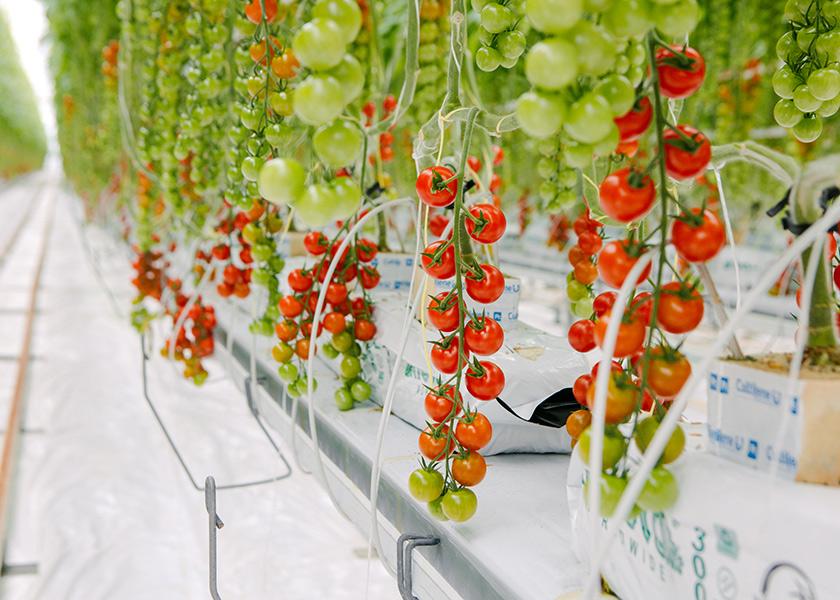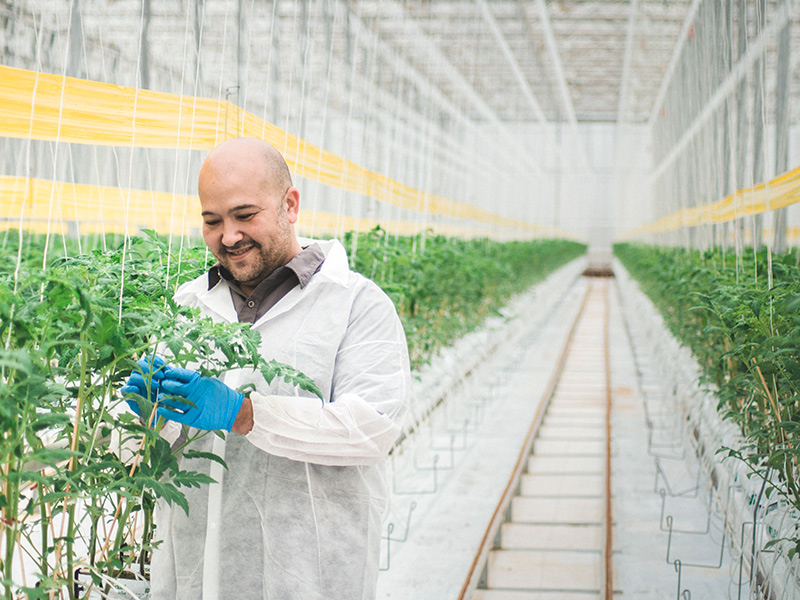Demand for greenhouse produce fuels sales surge, innovation

As climate change presents farmers with serious challenges in the field, from prolonged drought periods to heat waves, the greenhouse produce business is booming.
According to the “Commercial Greenhouse Market Report 2022” from Research and Markets, North America’s commercial greenhouse market is growing at a compound annual rate of more than 12%, with the U.S. leading the way in industry expansion.
In Canada, home to a large and robust greenhouse produce industry, the farm gate value for greenhouse vegetables and specialized fruits grew from 1.4 million Canadian dollars in 2017 to more than CA$2 million in 2021, according to Statistics Canada. By volume, greenhouse vegetable sales increased from 687,000 metric tons in 2020 to 723,000 tons in 2021.
“The greenhouse produce sector is the largest and fastest-growing segment here in Canada,” said Sonia Klinger, marketing manager at DelFrescoPure, an Ontario-based grower of tomatoes, bell peppers, strawberries, baby eggplant and more. “The need from both Canadian and American consumers to have a wide variety of fresh, year-round produce has really increased the demand. Our retailers are taking note and are requesting consistent year-round volumes from their suppliers.”
The surge is due not only to increasing consumer demand, but also to escalating climate change challenges and the growing need for farmers to achieve higher yields with limited water and land.
“Our farms can provide more than 15 times the yield of field farming and can produce nutritious greenhouse vegetables year-round,” said Richard Lee, executive director of the Ontario Greenhouse Vegetable Growers trade association. In addition, he said, greenhouse produce helps meet consumer demand for sustainably farmed products because its production requires less pesticide than conventionally grown field vegetables.
Ryan Cherry, director of sales at Windset Farms, which grows greenhouse tomatoes, peppers and cucumbers in Delta, British Columbia, and in Santa Maria, Calif., also sees sustainable practices as an advantage.
“Demand for greenhouse-grown produce is rising as consumers are prioritizing environmental sustainability while still wanting high-quality produce,” including organic options, he said.

Variety is trending
As shoppers increasingly expect to find their favorite produce in stores all year, seasonality is becoming a thing of the past, said Chris Veillon, chief marketing officer at Pure Flavor, an Ontario-based collection of greenhouse vegetable growers.
“We’re seeing greater adaptation at retail,” with greater product assortments and the launch of new varieties, he said.
Pure Flavor most recently addressed the desire for variety in May 2022 with the launch of its Solara Mini Galia melon. The personal-sized melon took eight years to develop in partnership with Cornell University and was the first greenhouse-grown variety to hit the commercial market in North America.
“It gives consumers a more cost-effective solution to what they are purchasing currently,” said Pure Flavor President Jamie Moracci, adding that because of its petite size, the melon leads to less waste. Its year-round availability is another benefit. “That means a greater consistency in supply.”
Related news: Experts discuss what's ahead for the shifting CEA marketplace
Shoppers are also craving year-round choices within established categories.
As consumers seek out convenient, nutritious options that fit with their healthier lifestyles, said Cherry, “there is a growing trend towards snacking varieties, specifically grape and cherry tomatoes of different colors and shapes.”
Klinger has also seen a jump in retailer requests for snack-size items.
“Our customers are looking for convenient, clean and healthy options,” she said.
Addressing challenges through innovation
Rising consumer interest in greenhouse produce comes with its own set of challenges.
“Competition is becoming increasingly fierce,” Veillon said. “Mergers and acquisitions are increasing, major expansions are happening everywhere and significant investments are being made to grow from within to meet the demand for more product.”
This is certainly true of Pure Flavor. Along with building new warehouse and distribution centers, the company recently purchased DeTemporada Farms and Cervini C5 Farms — both in Ontario — to help ramp up production.
While inflation continues to present difficulties for produce growers, companies such as Windset Farms are finding ways to keep prices manageable through collaborations between growers, packers, shippers and logistics personnel.
Related news: Robot arms will harvest Oishii’s strawberries
“Time management, food-mile efficiency and cold chain preservation also work to minimize waste and lead to a sensible supply chain,” Cherry said. “This results in price stabilization to fit the family budget.”
Lee sees opportunities for greenhouse industry growth through innovations such as trigeneration, in which natural gas is used to produce clean electricity, heat and carbon dioxide for greenhouse crops. In addition, the use of advanced supplemental lighting allows farms to grow produce year-round, and some growers are beginning to adopt robotics in their operations.
“Current trials are being conducted that utilize drones to displace the workforce that is aging or no longer cares to work in agriculture,” Lee said. “Drones are being used to mist plants, apply shading agents to reduce internal temperatures and to apply sprays to the crop when needed.”
Campaigns for continued success
Consumers are becoming increasingly aware of the selling points of greenhouse produce, and growers are working — both on their own and in partnership with retailers — to reinforce those messages.
With consumer education in mind, Ontario Greenhouse Vegetable Growers is preparing to launch a new marketing campaign in the U.S. called “This is Greenhouse Goodness.” The organization also supports retailer promotions through digital and print ads as well as a retailer display contest for stores throughout Ontario.
“This is a fun way to promote locally grown produce that encourages retailers to support greenhouse,” Lee said. “We hope to launch similar initiatives across North America to showcase the benefits of greenhouse-grown produce.”
Pure Flavor runs a dynamic marketing and communications program that focuses on digital content presented across multiple channels, including the company website, social media, email marketing and e-books. Content includes everything from recipes to behind-the-scenes information about the growing process.
“We are no longer a greenhouse vegetable company,” Veillon said. “We are now a lifestyle company that grows greenhouse fruits and vegetables to fuel healthy lives.”
Likewise, Windset Farms uses social media and its company website to showcase the benefits of greenhouse growing, and it works closely with retailers to assist with store merchandising, product demonstrations and advisements.
“It's crucial to know your retailers' target market and messaging to boost sales,” Cherry said. “We consider factors like importance of ‘locally grown,’ organics, convenience and price.”
Windset also takes advantage of the location of its greenhouse facilities near top retail distribution centers.
“Close proximity to market maximizes freshness, extends shelf life for our customers and reduces transportation emissions,” Cherry explained. “Labeling produce with a ‘Buy BC’ or ‘California Grown’ logo during this time of year can help retailers promote buying local.”
DelFrescoPure customizes its retailer promotions to help drive sales and awareness.
“We support them by providing marketing support, merchandising ideas like POS displays, plan-o-grams and consumer activations at store level,” Klinger said.
The company also creates fresh content regularly for its social media channels.
In the years to come, as climate change impacts continue, growers expect greenhouse production to become increasingly advantageous.
“Growing hydroponically within a greenhouse means control over our crops,” Klinger said. “We can regulate the temperatures, humidity and much more to optimize our crop’s ability to grow.”







